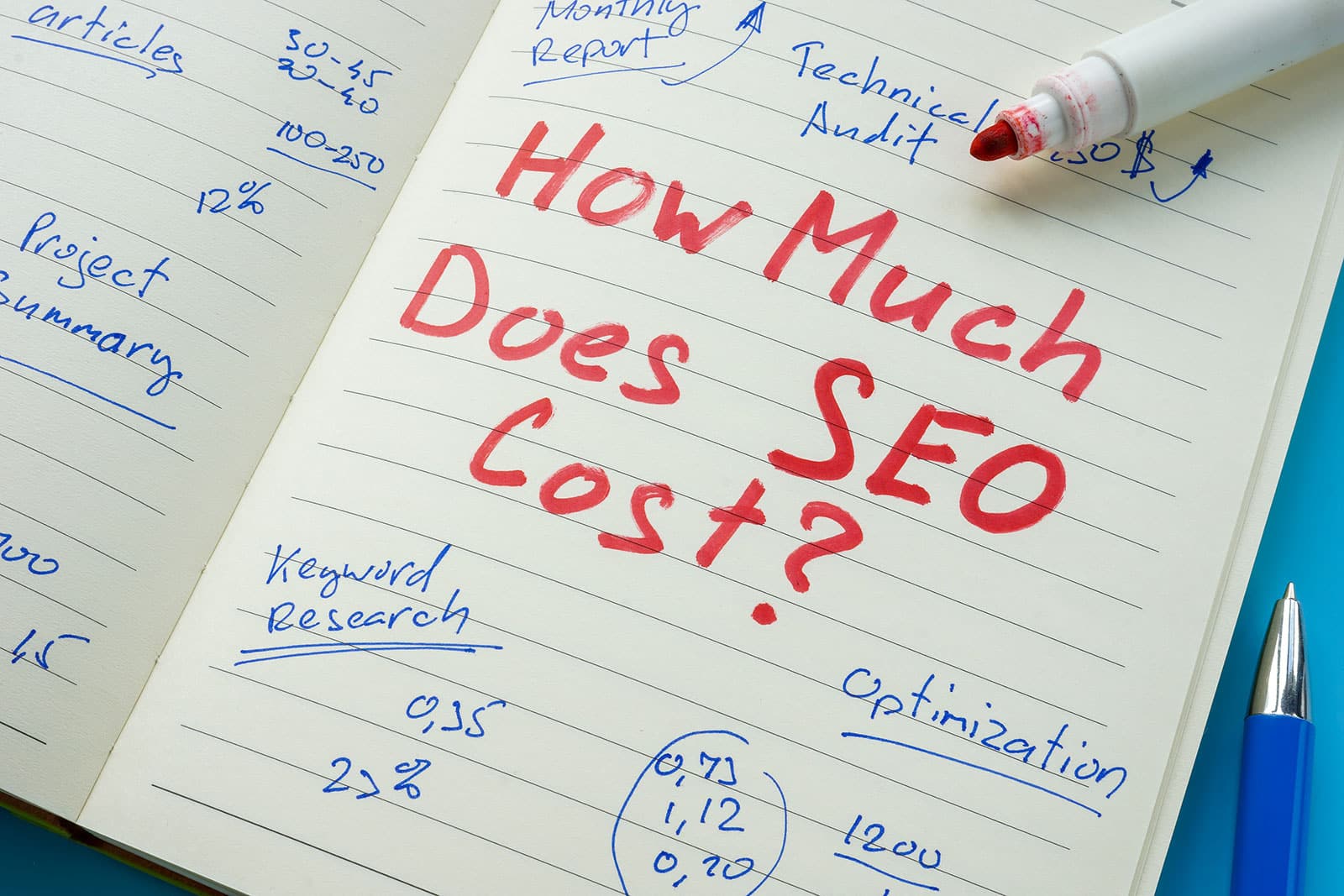Search engine optimization (SEO) is crucial for small businesses aiming to boost their online visibility and attract more customers. It involves optimizing website seo content to rank higher in search engine results, driving organic traffic. However, the cost of SEO services can vary based on factors like the complexity of the project, industry competition and desired outcomes.
Table of Contents
What Are SEO Services?
SEO services are key to attracting targeted traffic through the use of relevant keywords and phrases. The better your SEO, the better your organic search engine results pages (SERPs). Higher search engine rankings convey credibility and authority to customers, leading to increased trust in your brand. SEO keeps delivering benefits over time, while paid advertising (PPC/pay-per-click) stops generating visitors when the marketing budget runs out.
There are three main types of SEO:
- On-Page SEO: enhancing the visibility of certain web pages in search engines in order to generate organic traffic; this involves optimizing content, meta tags, headers and internal linking structures.
- Off-Page SEO: boosting the authority and relevance of a website via the acquisition of backlinks from other respectable websites. Link development, social media advertising and reaching out to influencers are all examples of off-page SEO tactics.
- Technical SEO: making sure search engines properly index your site by making it mobile-friendly and increasing its speed.
Factors Influencing SEO Costs
The cost of SEO services can vary widely, depending on several factors. Firstly, a business’s specific objectives significantly influence the cost. For instance, increasing website traffic may require different strategies and resources compared to improving conversion rates or boosting online visibility in a competitive market.
Additionally, the current SEO status of a business plays a crucial role in determining costs. A website with poor optimization or a weak backlink profile may require more extensive work, which can increase the initial investment. Furthermore, market dynamics and competition also impact SEO costs. In highly competitive industries, achieving top rankings requires more comprehensive and sophisticated strategies, which can drive up expenses.
Moreover, the choice of service model by a company has an impact on expenses. Under a monthly retainer model, clients pay a fixed fee on a monthly basis for ongoing SEO services. With project-based fees, clients pay a one-time fee for a specific SEO project or set of deliverables, such as website optimization, keyword research or high-quality content creation. Some SEO providers charge clients based on the number of hours worked on their project. Performance-based SEO pricing models allow clients to compensate SEO providers based on the performance outcomes achieved, such as improvements in search engine rankings, website traffic or conversions.
Average SEO Costs for Small Businesses
In general, small businesses can expect to pay anywhere from $500 to $5,000 per month for SEO services. Low-cost options might include basic SEO audits and keyword research, ranging from $500 to $1,000 per month. Mid-range SEO packages, which may include on-page optimization, content creation and link building, typically range from $1,000 to $3,000 per month. Freelancers’ hourly rate is typically over $+100/hr.
High-end services, such as comprehensive SEO strategies with advanced analytics and ongoing optimization, can cost $3,000 to $5,000 or more per month. Average costs may also fluctuate based on geographic location, the scope of services provided, and the reputation of the SEO agency.
DIY vs. Professional SEO Services
Handling SEO in-house entails lower immediate costs but requires extensive time, expertise and ongoing learning. Professionals offer experience, resources and efficiency, leading to better results. While in-house management suits some small businesses with limited needs, professional services are preferable for complex strategies and competitive markets like e-commerce, finance and healthcare, despite the higher upfront investment.

Budgeting for SEO
Ideally, small businesses should dedicate around five to ten percent of their overall budget toward SEO initiatives. However, this percentage can vary depending on factors such as industry competitiveness, business goals and current online presence. Spend your first investments wisely on things like website optimization and content production. To analyze data and find keywords, use free or SEO tools such as Moz, SEMrush, Ahrefs and Google Analytics. To further optimize efficiency and cost-effectiveness, make use of internet resources like forums, webinars and blogs to keep up with SEO trends and tactics.
Maximizing Your SEO Investment
Focus on SEO tactics that have the most significant impact on improving search engine rankings and driving organic traffic, such as keyword optimization, content creation and link building. Regularly track key performance indicators like website traffic, keyword rankings and conversion rates to assess the effectiveness of SEO efforts and identify areas for improvement. Use data analytics tools to gain insights into user behavior, market trends and competitor strategies. This augments informed decision-making and the strategic use of SEO tactics for maximum impact.
Questions to Ask Potential SEO Providers
To get a better idea of how the SEO service will fit in with company SEO goals and how much it will cost, it’s a good idea to ask SEO companies, SEO consultants, SEO professionals, SEO Experts, and freelancers questions about their methodology, previous work and price structure. The most important questions to ask are:
- Can you provide examples of clients in the same (or similar) industry that you’ve worked with? (Case Studies/Track Record)
- How do you quantify target audience conversions?
- Can you explain your approach to resolving duplicate content and canonicalization?
- How do you address site speed and mobile-friendliness for SEO purposes?
- What measures do you take to optimize website structure and navigation?
- How do you determine SEO campaign success?
- What tools do you use for analytics and tracking?
- Do you offer different types of services like Ecommerce SEO, per-project campaigns, Local SEO services, Monthly SEO Services?
- When can we expect to see results?
- How do you handle website indexing and crawlability issues?
- What pricing models do you offer? (Expensive vs Cheap SEO)
- What features come with each pricing model?
- Will we have access to the site’s analytics? (Metrics)
- With changing algorithms, how does that change your SEO plan?
- How do you stay up-to-date on the latest SEO tactics and know how?
Bottom Line
Effective SEO is not merely a one-time expense but an ongoing component of your content marketing strategy. By allocating resources effectively and understanding the long-term benefits, you can maximize your ROI (return on investment) and establish a strong online presence. Approaching SEO as a continuous endeavor allows for agile strategy adaptation, ensuring sustained growth and competitiveness in the digital realm.
Want to share your insights, ask questions and engage with fellow small business owners to enhance your SEO journey and business needs? Contact us to collaborate with us and unlock the full potential of your digital marketing efforts!
FAQ
How much does a website designer cost?
